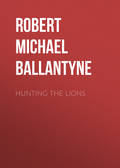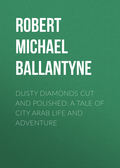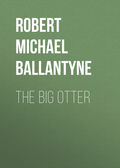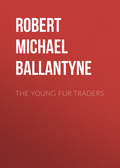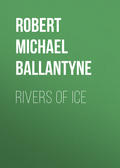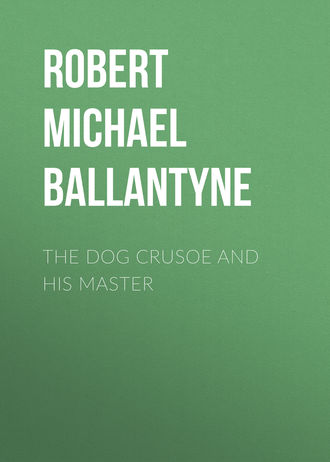
Robert Michael Ballantyne
The Dog Crusoe and his Master
But there seemed to be no possibility of choking this horse. Either the muscles of his neck were too strong, or there was something wrong with the noose which prevented it from acting, for the furious creature dashed and bounded backwards and sidewise in its terror for nearly an hour, dragging Dick after it, till he was almost exhausted, and yet, at the end of that time, although flecked with foam and panting with terror, it seemed as strong as ever. Dick held both lines, for the short one attached to its lower jaw gave him great power over it. At last he thought of seeking assistance from his dog.
“Crusoe,” he cried, “lay hold, pup.”
The dog seized the long line in his teeth, and pulled with all his might. At the some moment Dick let go the short line and threw all his weight upon the long one. The noose tightened suddenly under this strain, and the mustang, with a gasp, fell choking to the ground.
Dick had often heard of the manner in which the Mexicans “break” their horses, so he determined to abandon the method which had already almost worn him out, and adopt the other, as far as the means in his power rendered it possible. Instead, therefore, of loosening the lasso and re-commencing the struggle, he tore a branch from a neighbouring bush, cut the hobbles, strode with his legs across the fallen steed, seized the end of the short line or bridle, and then, ordering Crusoe to quit his hold, he loosened the noose which compressed the horse’s neck, and had already well-nigh terminated its existence.
One or two deep sobs restored it, and in a moment it leaped to its feet with Dick firmly on its back! To say that the animal leaped and kicked in its frantic efforts to throw this intolerable burden would be a tame manner of expressing what took place. Words cannot adequately describe the scene. It reared, plunged, shrieked, vaulted into the air, stood straight up on its hind-legs, and then almost as straight upon its fore ones, but its rider held on like a burr. Then the mustang raced wildly forwards a few paces, then as wildly back, and then stood still and trembled violently. But this was only a brief lull in the storm, so Dick saw that the time was now come to assert the superiority of his race.
“Stay back, Crusoe, and watch my rifle, pup,” he cried, and, raising his heavy switch he brought it down with a sharp cut across the horse’s flank, at the same time loosening the rein which hitherto he had held tight.
The wild horse uttered a passionate cry, and sprang forward like the bolt from a cross-bow.
And now commenced a race, which, if not as prolonged, was at least as furious as that of the far-famed Mazeppa. Dick was a splendid rider, however,—at least as far as “sticking on” goes. He might not have come up to the precise pitch desiderated by a riding-master in regard to carriage, etcetera, but he rode that wild horse of the prairie with as much ease as he had formerly ridden his own good steed, whose bones had been picked by the wolves not long ago.
The pace was tremendous, for the youth’s weight was nothing to that muscular frame which bounded with cat-like agility from wave to wave of the undulating plain in ungovernable terror. In a few minutes the clump of willows where Crusoe and his rifle lay were out of sight behind, but it mattered not, for Dick had looked up at the sky and noted the position of the sun at the moment of starting. Away they went on the wings of the wind, mile after mile over the ocean-like waste—curving slightly aside now and then to avoid the bluffs that occasionally appeared on the scene for a few minutes and then swept out of sight behind them. Then they came to a little rivulet; it was a mere brook of a few feet wide, and two or three yards, perhaps, from bank to bank. Over this they flew, so easily that the spring was scarcely felt, and continued the headlong course. And now a more barren country was around them. Sandy ridges and scrubby grass appeared everywhere, reminding Dick of the place where he had been so ill. Rocks, too were scattered about, and at one place the horse dashed with clattering hoofs between a couple of rocky sand-hills which, for a few seconds, hid the prairie from view. Here the mustang suddenly shied with such violence that his rider was nearly thrown, while a rattlesnake darted from the path. Soon they emerged from this pass, and again the plains became green and verdant. Presently a distant line of trees showed that they were approaching water, and in a few minutes they were close on it. For the first time Dick felt alarm; he sought to check his steed, but no force he could exert had the smallest influence on it.
Trees and bushes flew past in bewildering confusion; the river was before him; what width, he could not tell, but he was reckless now, like his charger, which he struck with the willow rod with all his force as they came up. One tremendous bound, and they were across, but Dick had to lie flat on the mustang’s back as it crashed through the bushes to avoid being scraped off by the trees. Again they were on the open plain, and the wild horse began to show signs of exhaustion.
Now was its rider’s opportunity to assert his dominion. He plied the willow rod and urged the panting horse on, until it was white with foam and laboured a little in its gait. Then Dick gently drew the halter, and it broke into a trot; still tighter—and it walked—and in another minute stood still, trembling in every limb. Dick now quietly rubbed its neck, and spoke to it in soothing tones, then he wheeled it gently round and urged it forward. It was quite subdued and docile. In a little time they came to the river and forded it, after which they went through the belt of woodland at a walk. By the time they reached the open prairie, the mustang was recovered sufficiently to feel its spirit returning, so Dick gave it a gentle touch with the switch, and away they went on their return journey.
But it amazed Dick not a little to find how long that journey was. Very different was the pace, too, from the previous mad gallop, and often would the poor horse have stopped had Dick allowed him. But this might not be. The shades of night were approaching, and the camp lay a long way ahead.
At last it was reached, and Crusoe came out with great demonstrations of joy, but was sent back lest he should alarm the horse. Then Dick jumped off his back, stroked his head, put his cheek close to his mouth, and whispered softly to him, after which he fastened him to a tree and rubbed him down slightly with a bunch of grass. Having done this, he left him to graze as far as his tether would permit, and, after supping with Crusoe, lay down to rest, not a little elated with his success in this first attempt at “creasing” and “breaking” a mustang.
Chapter Sixteen.
Dick becomes a horse tamer—Resumes his journey—Charlie’s doings—Misfortunes which lead to, but do not terminate in, the Rocky Mountains—A grizzly bear
There is a proverb—or a saying—or at least somebody or book has told us, that some Irishman once said—“Be aisy, or, if ye can’t be aisy, be as aisy as ye can.”
Now, we count that good advice, and strongly recommend it to all and sundry. Had we been at the side of Dick Varley on the night after his taming of the wild horse, we would have strongly urged that advice upon him. Whether he would have listened to it or not is quite another question—we rather think not. Reader, if you wish to know why, go and do what he did, and if you feel no curious sensations about the region of the loins after it, we will tell you why Dick Varley wouldn’t have listened to that advice. Can a man feel as if his joints were wrenched out of their sockets, and listen to advice—be that advice good or bad? Can he feel as though these joints were trying to re-set and re-dislocate themselves perpetually—and listen to advice? Can he feel as if he were sitting down on red-hot iron, when he’s not sitting down at all—and listen to advice? Can he—but no! why pursue the subject? Poor Dick spent that night in misery, and the greater part of the following day in sleep, to make up for it.
When he got up to breakfast in the afternoon, he felt much better, but shaky.
“Now, pup,” he said, stretching himself, “we’ll go and see our horse. Ours, pup; yours and mine: didn’t you help to catch him, eh! pup?”
Crusoe acknowledged the fact with a wag, and a playful “bow-wow-wow-oo-ow!” and followed his master to the place where the horse had been picketted. It was standing there quite quiet, but looking a little timid.
Dick went boldly up to it, and patted its head and stroked its nose, for nothing is so likely to alarm either a tame or a wild horse as any appearance of timidity or hesitation on the part of those who approach them.
After treating it thus for a short time, he stroked down its neck, and then its shoulders—the horse eyeing him all the time nervously. Gradually he stroked its back and limbs gently, and walked quietly round and round it once or twice, sometimes approaching and sometimes going away, but never either hesitating or doing anything abruptly. This done, he went down to the stream and filled his cap with water and carried it to the horse, which snuffed suspiciously and backed a little, so he laid the cap down, and went up and patted him again. Presently he took up the cap and carried it to his nose; the poor creature was almost choking with thirst, so that, the moment he understood what was in the cap, he buried his lips in it and sucked it up.
This was a great point gained, he had accepted a benefit at the hands of his new master; he had become a debtor to man, and no doubt he felt the obligation. Dick filled the cap, and the horse emptied it again, and again, and again, until its burning thirst was slaked. Then Dick went up to his shoulder, patted him, undid the line that fastened him, and vaulted lightly on his back!
We say lightly, for it was so, but it wasn’t easily, as Dick could have told you! However, he was determined not to forego the training of his steed on account of what he would have called a “little bit pain.”
At this unexpected act the horse plunged and reared a good deal, and seemed inclined to go through the performance of the day before over again, but Dick patted and stroked him into quiescence, and having done so, urged him into a gallop over the plains, causing the dog to gambol round in order that he might get accustomed to him. This tried his nerves a good deal, and no wonder, for if he took Crusoe for a wolf, which no doubt he did, he must have thought him a very giant of the pack.
By degrees they broke into a furious gallop, and after breathing him well, Dick returned and tied him to the tree. Then he rubbed him down again, and gave him another drink. This time the horse smelt his new master all over, and Dick felt that he had conquered him by kindness. No doubt the tremendous run of the day before could scarcely be called kindness, but without this subduing run he never could have brought the offices of kindness to bear on so wild a steed.
During all these operations Crusoe sat looking on with demure sagacity—drinking in wisdom and taking notes. We know not whether any notes made by the canine race have ever been given to the world, but certain are we that, if the notes and observations made by Crusoe on that journey were published, they would—to say the least—surprise us!
Next day Dick gave the wild horse his second lesson, and his name. He called him “Charlie,” after a much loved companion in the Mustang Valley. And long and heartily did Dick Varley laugh as he told the horse his future designation in the presence of Crusoe, for it struck him as somewhat ludicrous that a mustang, which, two days ago, pawed the earth in all the pride of independent freedom, should suddenly come down so low as to carry a hunter on his back and be named Charlie!
The next piece of instruction began by Crusoe being led up under Charlie’s nose, and while Dick patted the dog with his right hand he patted the horse with his left. It backed a good deal at first and snorted, but Crusoe walked slowly and quietly in front of him several times, each time coming nearer, until he again stood under his nose, then the horse smelt him nervously, and gave a sigh of relief when he found that Crusoe paid no attention to him whatever. Dick then ordered the dog to lie down at Charlie’s feet, and went to the camp to fetch his rifle, and buffalo robe, and pack of meat. These and all the other things belonging to him were presented for inspection, one by one, to the horse, who arched his neck, and put forward his ears, and eyed them at first, but smelt them all over, and seemed to feel more easy in his mind.
Next, the buffalo robe was rubbed over his nose, then over his eyes and head, then down his neck and shoulder, and lastly was placed on his back. Then it was taken off and flung on; after that it was strapped on, and the various little items of the camp were attached to it. This done, Dick took up his rifle and let him smell it; then he put his hand on Charlie’s shoulder, vaulted on to his back, and rode away.
Charlie’s education was completed; and now our hero’s journey began again in earnest, and with some prospect of its speedy termination.
In this course of training through which Dick put his wild horse, he had been at much greater pains and had taken far longer time than is usually the case among the Indians, who will catch, and “break,” and ride a wild horse into camp in less than three hours. But Dick wanted to do the thing well, which the Indians are not careful to do; besides, it must be borne in remembrance that this was his first attempt, and that his horse was one of the best and most high spirited, while those caught by the Indians, as we have said, are generally the poorest of a drove.
Dick now followed the trail of his lost companions at a rapid pace, yet not so rapidly as he might have done; being averse to exhausting his good dog and his new companion. Each night he encamped under the shade of a tree or a bush when he could find one, or in the open prairie when there were none, and, picketting his horse to a short stake or pin which he carried with him for the purpose, lit his fire, had supper, and lay down to rest. In a few days Charlie became so tame and so accustomed to his master’s voice that he seemed quite reconciled to his new life. There can be no doubt whatever that he had a great dislike to solitude, for on one occasion, when Dick and Crusoe went off a mile or so from the camp where Charlie was tied, and disappeared from his view, he was heard to neigh so loudly that Dick ran back thinking the wolves must have attacked him. He was all right, however, and exhibited evident tokens of satisfaction when they returned.
On another occasion his fear of being left alone was more clearly demonstrated.
Dick had been unable to find wood or water that day, so he was obliged to encamp upon the open plain. The want of water was not seriously felt, however, for he had prepared a bladder in which he always carried enough to give him one pannikin of hot syrup, and leave a mouthful for Crusoe and Charlie. Dried buffalo dung formed a substitute for fuel. Spreading his buffalo robe, he lit his fire, put on his pannikin to boil, and stuck up a piece of meat to roast, to the great delight of Crusoe, who sat looking on with much interest.
Suddenly Charlie, who was picketted a few hundred yards off in a grassy spot, broke his halter close by the head-piece, and with a snort of delight bounded away, prancing and kicking up his heels!
Dick heaved a deep sigh, for he felt sure that his horse was gone. However, in a little Charlie stopped, and raised his nose high in the air, as if to look for his old equine companions. But they were gone; no answering neigh replied to his; and he felt, probably for the first time, that he was really alone in the world. Having no power of smell, whereby he might have traced them out as the dog would have done, he looked in a bewildered and excited state all round the horizon. Then his eye fell on Dick and Crusoe sitting by their little fire. Charlie looked hard at them, and then again at the horizon; and then, coming to the conclusion, no doubt, that the matter was quite beyond his comprehension, he quietly took to feeding.
Dick availed himself of the chance, and tried to catch him; but he spent an hour with Crusoe in the vain attempt, and at last they gave it up in disgust and returned to the fire, where they finished their supper and went to bed.
Next morning they saw Charlie feeding close at hand; so they took breakfast, and tried to catch him again. But it was of no use; he was evidently coquetting with them, and dodged about and defied their utmost efforts, for there was only a few inches of line hanging to his head. At last it occurred to Dick that he would try the experiment of forsaking him. So he packed up his things, rolled up the buffalo robe, threw it and the rifle on his shoulder, and walked deliberately away.
“Come along, Crusoe!” he cried, after walking a few paces.
But Crusoe stood by the fire with his head up, and an expression on his face that said, “Hello, man! what’s wrong? You’ve forgot Charlie! Hold on! Are you mad?”
“Come here, Crusoe!” cried his master in a decided tone.
Crusoe obeyed at once. Whatever mistake there might be, there was evidently none in that command; so he lowered his head and tail humbly, and trotted on with his master; but he perpetually turned his head as he went, first on this side and then on that, to look and wonder at Charlie.
When they were far away on the plain, Charlie suddenly became aware that something was wrong. He trotted to the brow of a slope with his head and tail very high up indeed, and looked after them; then he looked at the fire and neighed; then he trotted quickly up to it, and, seeing that everything was gone, he began to neigh violently, and at last started off at full speed, and overtook his friends, passing within a few feet of them, and wheeling round a few yards off, stood trembling like an aspen leaf.
Dick called him by his name and advanced, while Charlie met him half-way, and allowed himself to be saddled, bridled, and mounted forthwith.
After this Dick had no further trouble with his wild horse.
At his next camping-place, which was in the midst of a cluster of bushes close beside a creek, Dick came unexpectedly upon a little wooden cross, which marked the head of a grave. There was no inscription on it, but the Christian symbol told that it was the grave of a white man. It is impossible to describe the rush of mingled feelings that filled the soul of the young hunter as he leaned on the muzzle of his rifle and looked at this solitary resting-place of one who, doubtless like himself, had been a roving hunter. Had he been young or old when he fell?—had he a mother in the distant settlement, who watched, and longed, and waited for the son that was never more to gladden her eyes?—had he been murdered, or had he died there and been buried by his sorrowing comrades? These and a thousand questions passed rapidly through his mind as he gazed at the little cross.
Suddenly he started. “Could it be the grave of Joe or Henri?” For an instant the idea sent a chill to his heart; but it passed quickly, for a second glance showed that the grave was old, and that the wooden cross had stood over it for years.
Dick turned away with a saddened heart; and that night, as he pored over the pages of his Bible, his mind was filled with many thoughts about eternity and the world to come. He, too, must come to the grave one day, and quit the beautiful prairies and his loved rifle. It was a sad thought; but while he meditated he thought upon his mother. “After all,” he murmured, “there must be happiness without the rifle, and youth, and health, and the prairie! My mother’s happy, yet she don’t shoot, or ride like wildfire over the plains.” Then that word which had been sent so sweetly to him through her hand came again to his mind, “My son, give me thine heart;” and as he read God’s book, he met with the word, “Delight thyself in the Lord, and he shall give thee the desire of thine heart.”
“The desire of thine heart.” Dick repeated this, and pondered it till he fell asleep.
A misfortune soon after this befell Dick Varley, which well-nigh caused him to give way to despair. For some time past he had been approaching the eastern slopes of the Rocky Mountains—those ragged, jagged, mighty hills, which run through the whole continent from north to south in a continuous chain, and form, as it were, the backbone of America. One morning, as he threw the buffalo robe off his shoulders and sat up, he was horrified to find the whole earth covered with a mantle of snow. We say he was horrified, for this rendered it absolutely impossible any further to trace his companions either by scent or sight.
For some time he sat musing bitterly on his sad fate, while his dog came and laid his head sympathisingly on his arm.
“Ah! pup,” he said, “I know ye’d help me if ye could! But it’s all up now; there’s no chance of findin’ them—none.”
To this Crusoe replied by a low whine. He knew full well that something distressed his master, but he hadn’t yet ascertained what it was. As something had to be done, Dick put the buffalo robe on his steed, and, mounting, said, as he was in the habit of doing each morning, “Lead on, pup.”
Crusoe put his nose to the ground and ran forward a few paces, then he returned and ran about snuffing and scraping up the snow. At last he looked up, and uttered a long melancholy howl.
“Ah! I knowed it,” said Dick, pushing forward. “Come on, pup, you’ll have to follow now. Any way we must go on.”
The snow that had fallen was not deep enough to offer the slightest obstruction to their advance. It was, indeed, only one of those occasional showers common to that part of the country in the late autumn, which season had now crept upon Dick almost before he was aware of it, and he fully expected that it would melt away in a few days. In this hope he kept steadily advancing, until he found himself in the midst of those rocky fastnesses which divide the waters that flow into the Atlantic from those that flow into the Pacific Ocean. Still the slight crust of snow lay on the ground, and he had no means of knowing whether he was going in the right direction or not.
Game was abundant, and there was no lack of wood now, so that his night bivouac was not so cold or dreary as might have been expected.
Travelling, however, had become difficult, and even dangerous, owing to the rugged nature of the ground over which he proceeded. The scenery had completely changed in its character. Dick no longer coursed over the free, open plains, but he passed through beautiful valleys filled with luxuriant trees, and hemmed in by stupendous mountains, whose rugged sides rose upward until the snow-clad peaks pierced the clouds.
There was something awful in these dark solitudes, quite overwhelming to a youth of Dick’s temperament; his heart began to sink lower and lower every day, and the utter impossibility of making up his mind what to do became at length agonising. To have turned and gone back the hundreds of miles over which he had travelled would have caused him some anxiety under any circumstances, but to do so while Joe and Henri were either wandering about there or in the power of the savages, was, he felt, out of the question. Yet, in which way should he go? Whatever course he took might lead him further and further away from them.
In this dilemma he came to the determination of remaining where he was, at least until the snow should leave the ground.
He felt great relief even when this hopeless course was decided upon, and set about making himself an encampment with some degree of cheerfulness. When he had completed this task, he took his rifle, and leaving Charlie picketted in the centre of a dell, where the long, rich grass rose high above the snow, went off to hunt.
On turning a rocky point his heart suddenly bounded into his throat, for there, not thirty yards distant, stood a huge grizzly bear!
Yes, there he was at last, the monster to meet which the young hunter had so often longed,—the terrible size and fierceness of which he had heard so often spoken about by the old hunters. There it stood at last; but little did Dick Varley think that the first time he should meet with his foe should be when alone in the dark recesses of the Rocky Mountains, and with none to succour him in the event of the battle going against him. Yes! there was one. The faithful Crusoe stood by his side, with his hair bristling, all his formidable teeth exposed, and his eyes glaring in their sockets. Alas! for poor Crusoe, had he gone into that combat alone. One stroke of that monster’s paw would have hurled him dead upon the ground.



